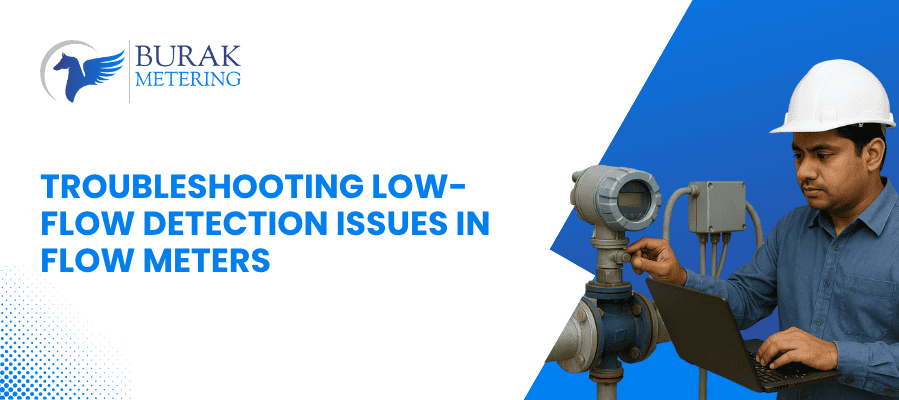 Phone
Phone

Accurate flow measurement is important in various industries, from water management to chemical processing. A common problem in flow measurement is low flow rate detection issues in flow meters.
It happens when flow meters fail to detect low flow rates accurately, This problem can lead to inefficiencies and potential losses in operations.
Understanding why this happens and how to fix it is crucial for maintaining smooth and reliable flow meter performance.
If you are experiencing low flow rate issues with your meter, don't worry — They can be easily solved. This blog will explore the common causes of flow problems and solutions to resolve this issue effectively.
Every flow meter: Every flow meter has a flow rate detection limit; if it exceeds this limit, the meter might not detect it at all, or it will give you an incorrect reading.
This happens because different flow meters work on different measurement principles, and some require a certain fluid movement to function properly.
Let's understand it through an example:
Some meters work by detecting the pressure changes or fluid velocity. At low flow rates, the pressure drop or velocity might get too small for the meter to pick up, resulting in inaccurate readings.
Solution:
Check the minimum flow rate specified by manufacturers. If the process regularly operates at low rates, then the meter can handle a low flow rate; otherwise, you need a meter that is designed for low-flow applications. such as thermal mass flow meters, Coriolis meters, and ultrasonic meters.
Sometimes, the fluid being measured can affect the accuracy of the flow meter readings, especially at low flow rates.
For example, Thick or sticky fluids move slowly and do not generate enough force to be detected by certain flow meters.
Meters that rely on velocity or mechanical movement struggle to register flow accurately, which can lead to pressure drops or no reading at all.
Solution:
Select a flow meter that is designed for your fluid type and ensure the system is set up to remove excess air or gas before measurement.
This issue can also arise if the flow meter is not properly calibrated or because of calibration drift due to wear, fluid properties, or environmental factors that can also affect its accuracy.
That’s why regular calibration is essential; it ensures the meter remains precise, especially for low-flow applications.
Additionally, high-sensitivity settings can also cause problems. Some digital flow meters have adjustable sensitivity settings that determine the minimum flow rate they can detect. If these settings are too high, the meter may overlook low flows entirely.
Solution:
Periodic calibration, sensitivity adjustments, and maintenance can ensure accurate measurement and prevent issues.
The accuracy of a flow meter can also be affected by incorrect or improper installation.
If your pipe is too large, the flow may be too thin for the meter to measure correctly, while a smaller one can cause excessive pressure buildup.
Orientation also plays a key role. Some flow meters require a specific position, such as horizontal or vertical, while others need a certain amount of straight pipe before and after the meter to ensure stable readings.
Additionally, pressure drops within the system can also lead to poor detection
If the flow meter is placed near bends, valves, or obstructions, then sudden changes in the pressure can interfere with measurement accuracy.
Solution:
Struggling with inaccurate flow readings? Upgrade to Burak’s high-precision flow meters for reliable performance. Find the perfect fit for your needs!
There are ways through which you can fix your flow meter issues. which include recalibration, maintenance, modifying the installation, and adjusting settings.
However, some problems are repeated, and attempting to repair them multiple times can become costly and inefficient. In such cases, replacing the flow meter could be a smarter decision.
Here are some signs that indicate it’s time to invest in a new flow meter:
If your flowmeter continues to provide incorrect readings even after multiple recalibrations, it could happen due to worn-out internal components. Over time, factors like these can lead to permanent inaccuracy.
If your meter requires frequent cleaning and maintenance, then in the long run, the maintenance cost can exceed the price of a new meter.
Mostly, old mechanical meters experience wear on moving parts and need frequent maintenance.
Some flow meters do not work efficiently if you change their operating condition.
For Example, if your system now handles higher-viscosity fluids, extreme temperatures, or lower flow rates, your existing meter may struggle to provide accurate readings.
In a situation like that, upgrading to a meter that matches your new requirements and ensures better efficiency will be suitable.
With advancements in flow measurement technology, newer meters offer improved accuracy and better data logging. If your existing meter lacks advanced features, then upgrading to a newer model can optimize your process.
Want to know more about flow meter problems? Explore common problems and their fixes!
If you are facing ongoing flow measurement issues despite multiple fixes and are thinking of switching to a more efficient flow meter to save both time and operational costs in the long run, then you can consider Burak. We are leading manufacturers of flow meters.
Contact us today to find the perfect solution for your application!